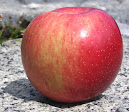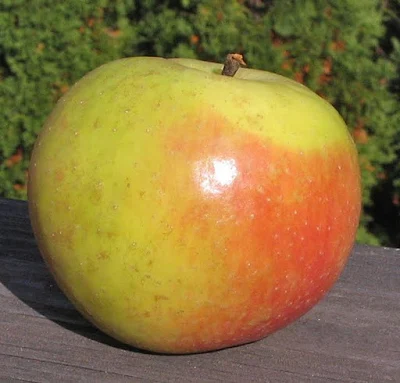When I published my review of Belle de Boskoop in 2011, a reader told me,
My samples look quite different.... Does yours have the 3 pronounced ribs on it?
The implication (delivered diplomatically) was, are you sure you got this right, dude?

|
When I published my review of Alexander earlier this year, another reader told me,
Looks like Belle de Boskoop to me, and the description is consistent with my experience with that variety. Your review of Boskoop displays an apple inconsistent with my experience in both appearance and qualities.
For the record, I am frequently unsure about apple identification, and I welcome correction. Confusion is rife in the apple world.
I've been misled by vendors and growers. When I encounter an apple for the first time, I have no personal basis (see "first time") to doubt.
So I'm pleased to have a fresh sample to try. Let's see if this clears anything up.
(I tasted this Boskoop in late October.)
The instant case
The underlying color is yellow with green tones. The apple wears a small warm red blush over this. There's patchy olive-brown russet throughout.
Add in numerous small lenticels filled in with grey or russet.
Boskoop's flesh is tender, coarse, juicy, and light yellow. Its flavors are acid-forward, more citric than spicy, and with a bitter note that may originate in the peel.
I also think there is a little vanilla in the background, but that is secondary.
This apple is not a spitter, and there is a decent amount of balancing sweet, but the harsher flavors dominate. I ate all of mine, but would not reach for another.
Of course, Belle de Boskoop is a cooking apple first and last. Everything about this one, including its acidity and assertive flavors, suggests it is an excellent one.
Alexander
This Boskoop is 9 inches around, versus 12 for Alexander. Alexander is quite ribbed, Boskoop only moderately so.
Alexander's flesh is firmer and crisper than either of my Boskoops, though that could be a natural variation related to freshness and so forth.
Boskoop
|
|
One should not insist on an apple that is absolutely identical in every harvest. It's not unusual for the level of russeting to vary from year to year.
The hardest difference for me to swallow is the glossiness of 2011 versus 2024. These both grew at Scott Farm in Vermont, which surely never waxed its fruit.
However, I got 2024 from the farm in mid October. 2011 came from a specialty shop where the apple had been off the tree for a few weeks longer, perhaps time for more natural wax to develop.
Handling might have rubbed or polished the earlier sample. And the direct sun that shown on the apple when I took the 2011 photo, versus overcast in 2024, would emphasize the shine.
Perhaps, also, 2011 was a waxier year. There are certainly "russetier" years, and russet suppresses, or masks, natural wax.
Taste
Examples from different harvests, perhaps picked at different stages of ripeness, can look and taste different. Some varieties are particularly inconsistent from year to year.
Alexander's flavor profile is as close a match with the Boskoops as the one between the two Boskoops themselves. All share some flavor traits, such as acidity and harshness.
Secret identities
That doesn't mean the Boskoops are Boskoops, or the Alexander is Alexander. But at least for the time being I am going to refer to them that way.



A key identifying characteristic of Belle de Boskoop is its hammered skin - a slight bumpiness that can really only be felt rather than seen. It's an uncommon feature shared with a few other varieties like Annie Elizabeth and Cortland
ReplyDeleteThanks! That is not a term I am familiar with, though I have noticed a kind of subtle dimpling. "minor pocks and swells," in some varieties, such as Honeycrisp.
DeleteMaybe not the same thing. I'll keep this in mind when next I try this variety.
Questioning "I would like to ask" ? In the apple world is there anything stopping you from making your own names up and changing the names for each season and there for catching the customer imagingnation with names like appy apples and fruit-E juice-E .
ReplyDelete